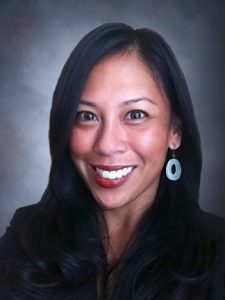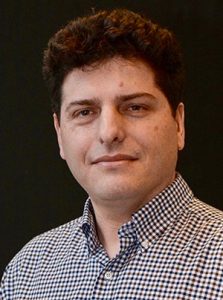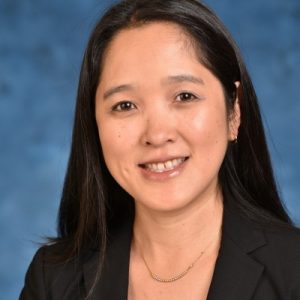In today’s post, we’ll focus on the CRESSTCON’18 breakout session Games and Simulations. This session will highlight research that pushes forward on the frontiers of learning and assessment by using technology to capture and analyze data in new and unobtrusive ways. Participants will discuss ways to capitalize and build on the possibilities of using telemetry to make current assessment, evaluation, and data-driven decisions more efficient, data rich, and adaptive. With innovative games and simulations that support future learning, participants will demonstrate how this work is making significant contributions to the national research and development agenda. Check out our session speakers below and join us in October at CRESSTCON’18.
Girlie Delacruz
 Girlie Delacruz is an experienced applied research scientist with over 18 years in the areas of assessment, learning, education, cognitive and learning science, and developmental psychology. Her primary research goals lie at the intersection of theories of assessment and learning in educational, training, and military contexts, with a focus on the design and use of various forms of technology including computers, web and mobile-based applications, video games, and sensor-based networks. In the area of assessment, her research focuses on issues of validity, effective and efficient assessment design, and the use of computational models to support formative assessment and adaptive learning. She is currently a Senior Research Associate at LRNG where she continues her research on the use of games for learning and assessment and applies her expertise to direct the assessment and badging work to help connect underserved populations to jobs and opportunities.
Girlie Delacruz is an experienced applied research scientist with over 18 years in the areas of assessment, learning, education, cognitive and learning science, and developmental psychology. Her primary research goals lie at the intersection of theories of assessment and learning in educational, training, and military contexts, with a focus on the design and use of various forms of technology including computers, web and mobile-based applications, video games, and sensor-based networks. In the area of assessment, her research focuses on issues of validity, effective and efficient assessment design, and the use of computational models to support formative assessment and adaptive learning. She is currently a Senior Research Associate at LRNG where she continues her research on the use of games for learning and assessment and applies her expertise to direct the assessment and badging work to help connect underserved populations to jobs and opportunities.
David Feldon
 David Feldon is a professor of Instructional Technology and Learning Sciences at Utah State University. His research examines the development and assessment of expertise—especially in STEM disciplines. One aspect of this work characterizes the cognitive components of expertise as they contribute to effective and innovative problem solving, as well as how they affect the quality of instruction that experts can provide. The other examines the development of research skills within STEM disciplines as a function of instruction and other educational support mechanisms. These efforts often engage cognitive task analysis techniques for developing performance-based assessments and informing instructional design and development.
David Feldon is a professor of Instructional Technology and Learning Sciences at Utah State University. His research examines the development and assessment of expertise—especially in STEM disciplines. One aspect of this work characterizes the cognitive components of expertise as they contribute to effective and innovative problem solving, as well as how they affect the quality of instruction that experts can provide. The other examines the development of research skills within STEM disciplines as a function of instruction and other educational support mechanisms. These efforts often engage cognitive task analysis techniques for developing performance-based assessments and informing instructional design and development.
Jenny Kao
 Jenny Kao is a Research Scientist with many years of experience in educational research. Her research interests are in reading and language development, and in work that enhances education for English learners and students with disabilities. She has been involved in research on developing reading curriculum for elementary school students; examining assessment accommodations for middle school students; and exploring career-readiness features in assessments for high school students. Dr. Kao holds a Ph.D. in Cognitive Studies in Education from Teachers College, Columbia University. In this breakout session, she will speak about the development of two game-based, prototype assessment items that focus on common career skills: problem solving, deductive reasoning, and inductive reasoning.
Jenny Kao is a Research Scientist with many years of experience in educational research. Her research interests are in reading and language development, and in work that enhances education for English learners and students with disabilities. She has been involved in research on developing reading curriculum for elementary school students; examining assessment accommodations for middle school students; and exploring career-readiness features in assessments for high school students. Dr. Kao holds a Ph.D. in Cognitive Studies in Education from Teachers College, Columbia University. In this breakout session, she will speak about the development of two game-based, prototype assessment items that focus on common career skills: problem solving, deductive reasoning, and inductive reasoning.
John Lee
 John Lee has been a Research Scientist for CRESST since 1999 and holds a PhD in Educational Psychology from UCLA. His current research focuses on technology-based assessments in a variety of military, civilian, and medical contexts with projects that involve the assessment of skills and competencies in many domains. His main research interests are in automated assessment of complex skills using ontologies and probabilistic inference models; the context of many of these assessments include the use of games and simulations.
John Lee has been a Research Scientist for CRESST since 1999 and holds a PhD in Educational Psychology from UCLA. His current research focuses on technology-based assessments in a variety of military, civilian, and medical contexts with projects that involve the assessment of skills and competencies in many domains. His main research interests are in automated assessment of complex skills using ontologies and probabilistic inference models; the context of many of these assessments include the use of games and simulations.


